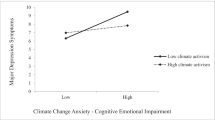Abstract
This paper examines the process by which enemies are created in the midst of conflict. Rather than accepting the premise that the parties to a conflict exist a priori and are set against one another once the ‘proper’ conditions exist, the paper argues that group-selves and enemy-others are created in the wake of a collective identity crisis. Under conditions of threat, collectivities may engage in a process best described by Julia Kristeva as abjection, whereby a group will cast off a familiar yet foreign part of the self and project into this severed part those unwanted or undesirable traits associated with vulnerability. This process of splitting is both trauma and response to trauma; as such the process is impossible to describe as it occurs. A proxy narrative, created to make sense of the process to the anxious and threatened group-self, presents a narrative of the conflict between the group-self and the enemy-other that does not acknowledge the previous relationship between the two. It is only through processes similar to adaptive mourning that a collectivity can come to question the content of a proxy narrative and re-evaluate the relationship with the abject-other. Through mourning, a new relationship can be forged and a new narrative of that relationship and its evolution through conflict can be created. Through mourning new futures become available, just as the past is re-evaluated and likewise created anew.


Similar content being viewed by others
References
Alexander, J. (2004) Toward a theory of trauma. In: J. Alexander, R. Eyerman, B. Giesen, N. Smelser and P. Sztompka (eds.) Cultural Trauma and Collective Identity. Berkeley, CA: University of California Press, pp. 1–30.
Barthes, R. (1996) Mythen des Alltags. Frankfurt am Main, Germany: Suhrkamp.
Caruth, C. (1995) Trauma: Explorations in Memory. Baltimore, MD: Johns Hopkins University Press.
Caruth, C. (1996) Unclaimed Experience: Trauma, Narrative, and History. Baltimore, MD: Johns Hopkins University Press.
Cramer, P. (1991) The Development of the Defense Mechanism: Theory, Research and Assessment. New York: Springer.
Csepeli, G., Erös, F., Neményi, M. and Örkény, A. (1996) Political Change – Psychological Change: Conversion Strategies in Hungary During the Transition from State Socialism to Democracy. Budapest, Hungary: Collegium Budapest/Institute for Advanced Studies.
Freud, S. (1919a, 1955) The ‘Uncanny’: Part I – Linguistic approach to the uncanny affects. Standard Edition of the Complete Psychological Works of Sigmund Freud, Vol. 17. London: Hogarth Press, pp. 219–225.
Freud, S. (1919b, 1955) The ‘Uncanny’: Part II – Phenomenology of uncanny affects. Standard Edition of the Complete Psychological Works of Sigmund Freud, Vol. 17. London: Hogarth Press, pp. 226–244.
Friedlander, S. (1992) Trauma, transference and ‘working through’ in writing the history of the Shoah. History and Memory 4 (1): 39–59.
Giesen, B. (2004) The trauma of perpetrators: The holocaust as traumatic reference of German national identity. In: J. Alexander, R. Eyerman, B. Giesen, N. Smelser and P. Sztompka (eds.) Cultural Trauma and Collective Identity. Berkeley, CA: University of California Press, pp. 112–154.
Haraszti, M. (2002) The ‘Real’ Viktor Orbán. Open Democracy. 1 May.
Homans, P. (1989) The Ability to Mourn. New York: Columbia University Press.
Hroch, M. (1993) From national movement to fully-formed nation: The nation-building process in Europe. New Left Review 198 (March/April): 3–20.
Jobbik (2008) Veterans join Hungarian guard, http://www.jobbik.com/index.php?categoryid=11&p2013_articleid=15, accessed 12 August 2008.
Klein, M. (1948) Contributions to Psychoanalysis 1921–1945. London: Hogarth Press.
Kristeva, J. (1982) The Power of Horror: An Essay on Abjection. New York: Columbia University Press.
Kristeva, J. (1983) Interview. All Area 2 (spring): 36–45.
Kristeva, J. (1991) Strangers to Ourselves. New York: Columbia University Press.
LaCapra, D. (1994) Representing the Holocaust: History, Theory, Trauma. Ithaca, NY: Cornell University Press.
Mack, J.E. (1979) Foreword. In: V. Volkan, (ed.) Cyprus – War and Adaptation. Charlottesville, VA: University Press of Virginia, pp. iii–xxviii.
Magyar Garda. (2008) A vasiak Nagykanizsán és Szombathelyen emlékeztek Trianonra, http://magyargarda.hu/node/1715, accessed 17 June 2008.
Meissner, W.W. (1987) Projection and projective identification. In: J. Sandler, (ed.) Projection, Identification and Projective Identification. Madison, CT: International Universities Press, pp. 27–49.
Mitscherlich, A. and Mitscherlich, M. (1975) The Inability to Mourn: Principles of Collective Behavior. New York: Grove Press.
Murer, J.S. (1999) Pursuing the familiar foreigner: The resurgence of anti-semitism in Hungary since 1989. Unpublished PhD dissertation. University of Illinois, Chicago.
Pók, A. (2004) Scapegoating and antisemitism after world war one: Hungarian political thought and action. In: A. Kovás and A. Eszter (eds.) Jewish Studies at Central European University III. Budapest, Hungary: Central European University Press, pp. 125–134.
Sandler, J. (1987) The concept of projective identification. In: J. Sandler, (ed.) Projection, Identification and Projective Identification. Madison, CT: International Universities Press, pp. 3–26.
Smelser, N. (2004) Psychological trauma and cultural trauma. In: J. Alexander, R. Eyerman, B. Giesen, N. Smelser and P. Sztompka (eds.) Cultural Trauma and Collective Identity. Berkeley, CA: University of California Press, pp. 31–59.
Smith, A. (1986) The Ethnic Origins of Nations. Oxford: Basil Blackwell Press.
Spurr, D. (1993) The Rhetoric of Empire: Colonial Discourse in Journalism, Travel Writing, and Imperial Administration. Durham, NC: Duke University Press.
Spurr, D. (1994) The Rhetoric of Empire. Durham, NC: Duke University Press.
Sztompka, P. (2004) The trauma of social change: A case of postcommunist societies. In: J. Alexander, R. Eyerman, B. Giesen, N. Smelser and P. Sztompka (eds.) Cultural Trauma and Collective Identity. Berkeley, CA: University of California Press, pp. 155–195.
Védegylet. (2007) Attack against lesbians and gays, http://www.vedegylet.hu/modules.php?name=News&file=article&sid=767, accessed 26 November.
Volkan, V. (1997) Blood Lines: From Ethnic Pride to Ethnic Terrorism. New York: Farrar, Straus and Giroux.
Volkan, V. (1988) The Need to Have Enemies and Allies. Northvale, NJ: Jason Aronson.
Yurchak, A. (2006) Everything Was Forever Until It Was No More. Princeton, NJ: Princeton University Press.
Author information
Authors and Affiliations
Corresponding author
Rights and permissions
About this article
Cite this article
Murer, J. Constructing the enemy-other: Anxiety, trauma and mourning in the narratives of political conflict. Psychoanal Cult Soc 14, 109–130 (2009). https://doi.org/10.1057/pcs.2008.33
Published:
Issue Date:
DOI: https://doi.org/10.1057/pcs.2008.33



